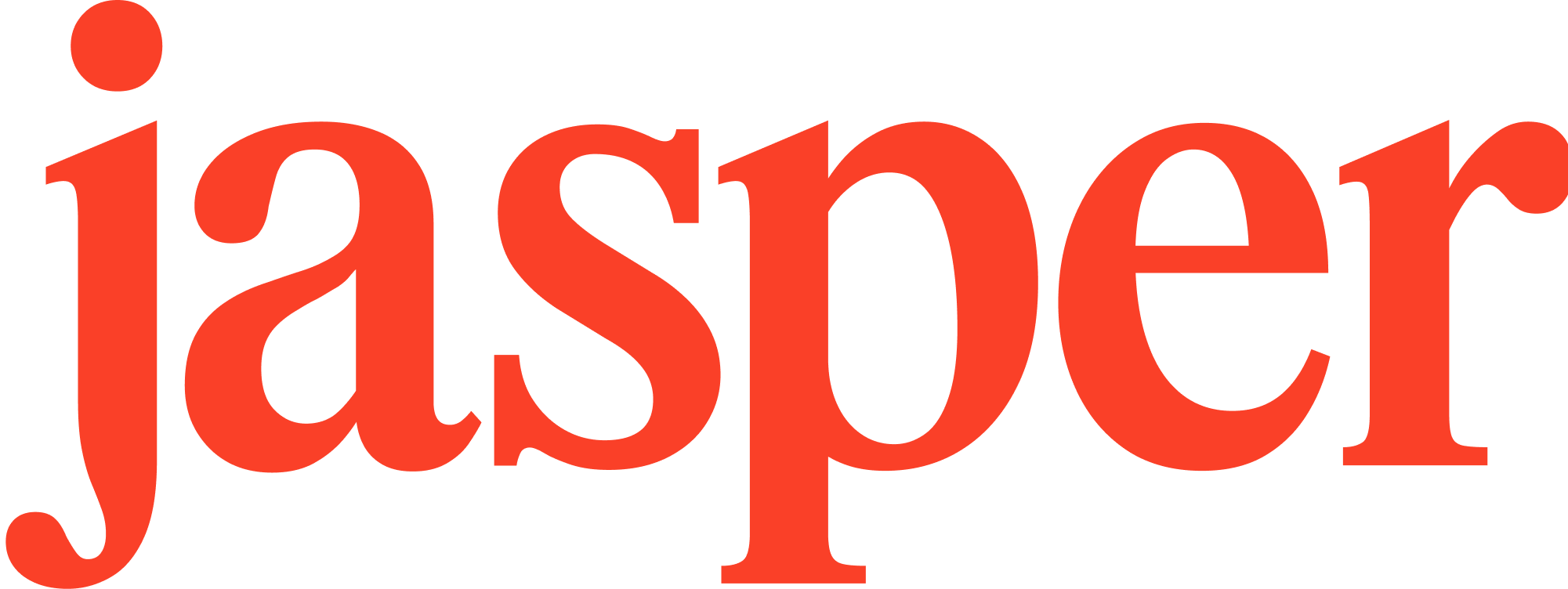Best Digital Marketing Tools in 2025
Digital marketing is how businesses grow, reach new audiences, and stay competitive. Whether you're managing social media, SEO, email campaigns, or analytics, the right digital marketing tools can save time, improve results, and simplify your workflow.
Why You Can Trust the Expertise of Sonary
At Sonary, we are committed to providing accurate and trustworthy information to help you make informed decisions. Our research process is meticulous, transparent, and guided by a dedication to maintaining the highest standards of integrity, ensuring accurate, real-world insights.
Read more
Unlike many other review platforms, we conduct in-depth evaluations of the software and services we feature. Our expert team tests and actively uses the tools we review to understand their features, performance, and value comprehensively. Our assessments are based on real-world use, giving you insights beyond surface-level descriptions. Our research methodology includes analyzing key consumer factors such as pricing, functionality, device usability, scalability, customer support quality, and unique industry-specific features. This hands-on approach and dedication to transparency mean you can trust Sonary to deliver regular, up-to-date content and recommendations that are well-researched and genuinely helpful for your business needs.
Finding the best marketing tools depends on your goals, budget, and business needs. Need better SEO rankings? Looking to automate your email marketing? Want deeper insights into customer behavior? This guide breaks down the top digital marketing platforms to help you find the right tools for your strategy.
Best Digital Marketing Tools in 2025

Features
General Features
Sales
Automation
Pros & Cons
Pros
Cons

Features
General Features
Marketing
Design
Pros & Cons
Pros
Cons

Features
General Features
Pros & Cons
Pros
Cons

Features
General Features
Pros & Cons
Pros
Cons

Features
Key Features
Supported File Formats
Pricing plans
Platform available on
Usability
Advanced Editing Tools
Sharing and Export
Export Formats
Pros & Cons
Pros
Cons
Quick Comparison
| Digital Marketing Tool | Key Feature | Best For | Platform | Pricing |
| Hubspot | All-in-one CRM and marketing automation | Enterprises and growing businesses | Cloud-based | Mid to high-range |
| Brevo | Email marketing and automation | Small businesses and startups | Cloud-based | Affordable |
| Ahrefs | SEO and backlink analysis | SEO agencies, digital marketers | Web-based | Mid to high-range |
| SEMrush | SEO research and competitive analysis | E-commerce brands | Web-based | Mid to high-range |
| Canva | Graphic design for marketing content | Freelancers, startups | Web and desktop app | Budget-friendly |
| Figma | Collaborative design for UI/UX and branding | Creative teams and enterprises | Web-based | Mid-range |
| DALL-E 3 | AI-generated images for marketing visuals | Marketing teams and content creators looking for AI-generated visuals | Web-based | Affordable to high-end |
| Adobe Photoshop | Advanced photo editing and branding | Enterprises and creative professionals | Desktop and cloud | High-end |
| Wix | Website builder with built-in marketing tools | Small businesses, freelancers, and startups | Web-based | Budget-friendly to mid-range |
| Shopify | E-commerce platform with marketing integrations | E-commerce businesses and online retailers | Web-based | Mid to high-range |
| ChatGPT | AI-generated content and chatbot functionality | Marketers, content creators, and businesses automating content | Web and mobile | Affordable to mid-range |
| Gemini | AI-powered search and content generation | Enterprises and businesses integrating AI into search and marketing | Web and mobile |
Affordable |
| Jasper | AI copywriting for marketing content | Copywriters, marketers, and agencies creating persuasive marketing content | Cloud-based | Mid-range |
| Grammarly | Grammar and style optimization for content | Writers, students, and professionals refining content | Web-based | Budget-friendly |
| Mailchimp | Email marketing and automation | Small businesses and e-commerce brands | Cloud-based | Affordable to mid-range |
Our Top Picks
Finding the right digital marketing tools depends on your business goals, budget, and how hands-on you want to be. Some tools are built for small businesses and freelancers who need affordable, easy-to-use solutions, while others cater to enterprises looking for full-scale automation and deep analytics. Whether you’re optimizing SEO, managing social media, automating emails, or designing marketing assets, the right software can make all the difference. Let’s break down the best options so you can find the perfect fit for your strategy.
Hubspot: Best for lead management
 Unified platform for sales and marketing
Unified platform for sales and marketing  Track customer interactions in real time
Track customer interactions in real time HubSpot is a comprehensive marketing automation and CRM platform designed to help businesses attract, engage, and convert leads. It offers a suite of tools for email marketing, social media management, SEO, content creation, and customer relationship management (CRM), all in one platform.
Hubspot is the ideal choice for businesses that want to automate marketing tasks, track customer interactions, and scale their digital efforts without juggling multiple platforms. Whether you’re focused on lead generation, nurturing, or sales alignment, HubSpot provides a holistic approach to marketing and customer management.
Key Features
- All-in-one marketing automation – Combines email marketing, social media, landing pages, and CRM in one platform for seamless workflows.
- Built-in CRM – Tracks customer interactions, manages leads, and aligns marketing and sales teams for better conversions.
- SEO and content marketing tools – Helps optimize blog posts, web pages, and landing pages with keyword suggestions and performance tracking.
- Email marketing and automation – Allows businesses to create, schedule, and personalize emails with automated workflows to nurture leads.
- Social media management – Enables users to schedule posts, track engagement, and manage multiple social accounts from one dashboard.
- Lead tracking and analytics – Provides in-depth insights into customer behavior, campaign performance, and ROI.
- Integration with third-party tools – Connects with platforms like Salesforce, WordPress, Shopify, and more for a flexible marketing stack.
- Customizable marketing funnels – Helps businesses design automated customer journeys to nurture leads and drive conversions.
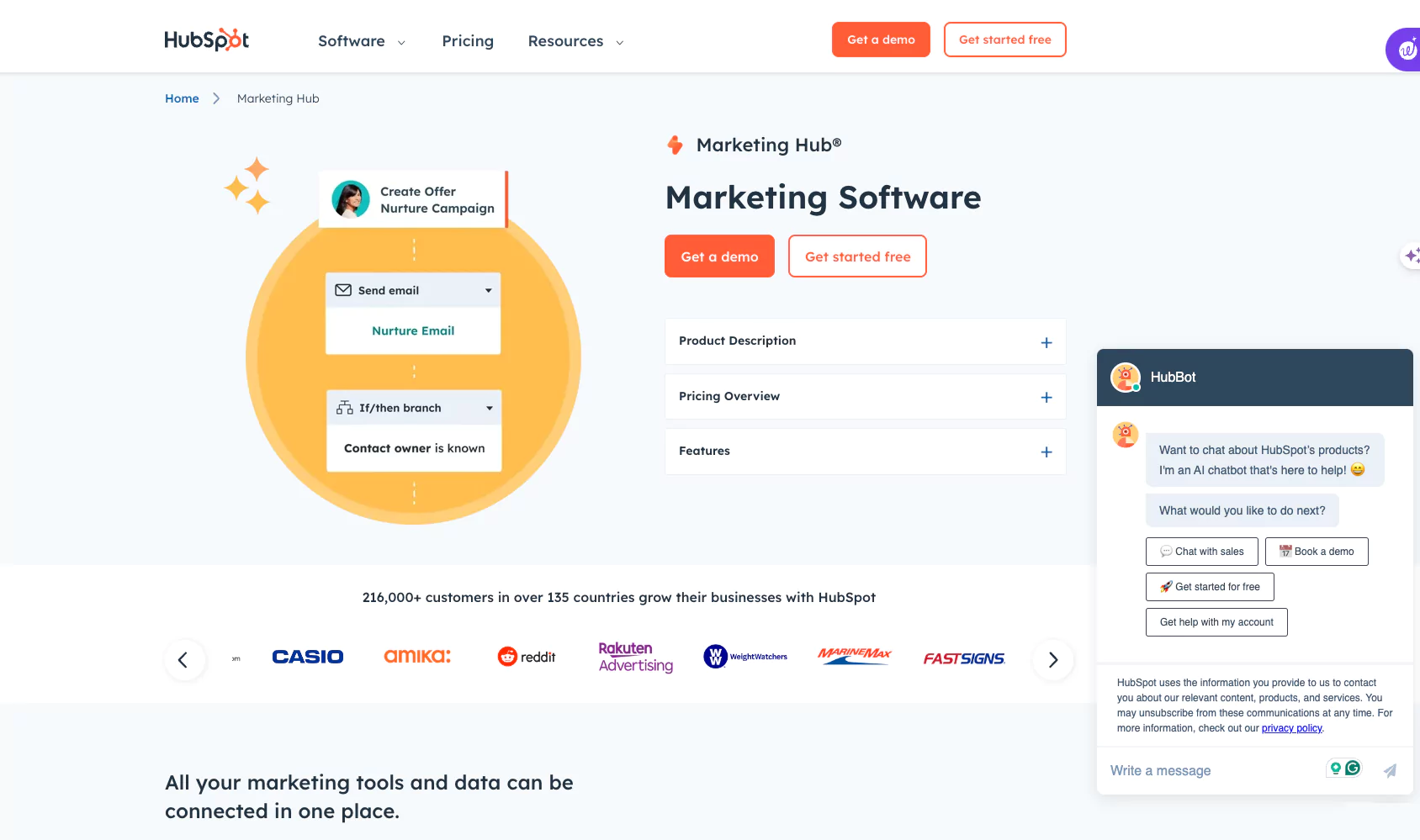
Pros and Cons
- Pros
- All-in-one platform for marketing, sales, and CRM.
- User-friendly interface with powerful automation tools.
- Strong lead tracking and customer management capabilities.
- Built-in SEO and content marketing features.
- Seamless integration with popular third-party tools.
- Scalable for small businesses and large enterprises.
- Cons
- Pricing can be expensive for advanced features.
- Some automation features have a learning curve.
- Limited customization in lower-tier plans.
- CRM functionality may not be as advanced as dedicated CRM platforms.
Who It’s For
HubSpot is ideal for small to mid-sized businesses and enterprises that want an all-in-one marketing automation and CRM platform. It’s perfect for businesses looking to streamline lead generation, automate workflows, and improve customer relationships without juggling multiple tools. Marketers, sales teams, and content creators who need SEO, email marketing, and social media management in one place will find HubSpot a strong fit. However, businesses on a tight budget or those needing highly customizable automation may want to explore more affordable or flexible alternatives.
Brevo: Best for email automation & CRM
 Easily create, send & analyze email campaigns
Easily create, send & analyze email campaigns  Simple & powerful marketing automations
Simple & powerful marketing automations Brevo (formerly Sendinblue) is a straightforward, no-fuss email marketing and automation platform built for small businesses and startups that want effective marketing without breaking the bank. It’s got everything you need—email campaigns, automation, SMS marketing, live chat, and even a built-in CRM—all in one place.
Unlike some of the more complex marketing tools out there, Brevo keeps things simple and user-friendly. You can design emails with an easy drag-and-drop builder, set up automated workflows, and connect with customers through multiple channels—all without needing a marketing degree.
Key Features
- Email marketing and automation – Create, schedule, and automate email campaigns with a drag-and-drop editor and pre-built workflows.
- SMS marketing – Send personalized SMS messages to engage customers and boost conversions.
- Built-in CRM – Manage contacts, track customer interactions, and segment audiences for more targeted marketing.
- Live chat and chatbots – Connect with website visitors in real-time to improve customer support and engagement.
- Transactional emails – Send order confirmations, password resets, and other essential emails with high deliverability rates.
- A/B testing and analytics – Optimize campaigns with detailed reports, open rates, and engagement insights.
- Segmentation and personalization – Send highly targeted messages based on customer behavior and preferences.
- Integrations with business tools – Works with WordPress, Shopify, WooCommerce, and other platforms for seamless marketing operations.

Pros and Cons
- Pros
- Affordable pricing, great for small businesses.
- Easy-to-use email marketing and automation features.
- Supports SMS marketing, live chat, and CRM.
- No sending limits on free plans.
- Simple setup with an intuitive interface.
- Cons
- Fewer advanced automation features than premium platforms.
- Limited integrations compared to larger competitors.
- Reporting and analytics are not as in-depth as enterprise tools.
Who It’s For
Brevo is best for small businesses, startups, and freelancers looking for an affordable, easy-to-use email marketing platform with extra tools like SMS campaigns and CRM. It’s a great choice for brands that need basic automation without the complexity or high costs of larger platforms.
Ahrefs: Best for backlink analysis
 Find content ideas & link opportunities
Find content ideas & link opportunities  Audit & optimize your website SEO
Audit & optimize your website SEO Ahrefs is a powerful SEO tool designed to help businesses improve search rankings, analyze competitors, and optimize website content. Known for its industry-leading backlink database and keyword research capabilities, Ahrefs gives marketers deep insights into how their site is performing and where they can improve. Ahrefs provides a full suite of features for tracking rankings, auditing websites, analyzing backlinks, and finding content opportunities. It’s a go-to platform for businesses that want to increase organic traffic and stay ahead of competitors in search results.
Key Features
- Site explorer – Analyze competitors’ websites, track backlinks, and see what’s driving their traffic.
- Keyword explorer – Find high-performing keywords, assess competition, and uncover search volume trends.
- Site zudit – Scan your website for SEO issues, broken links, and technical improvements.
- Content explorer – Discover trending topics and analyze what type of content performs best in your industry.
- Rank tracker – Monitor keyword rankings and see how your site is performing in search results.
- Backlink analysis – Access one of the largest backlink databases to track links pointing to your site and your competitors’ sites.
- Traffic estimation – Get insights into how much traffic competitors are getting from search engines.
- SEO reports and alerts – Stay updated on ranking changes, lost backlinks, and new SEO opportunities.
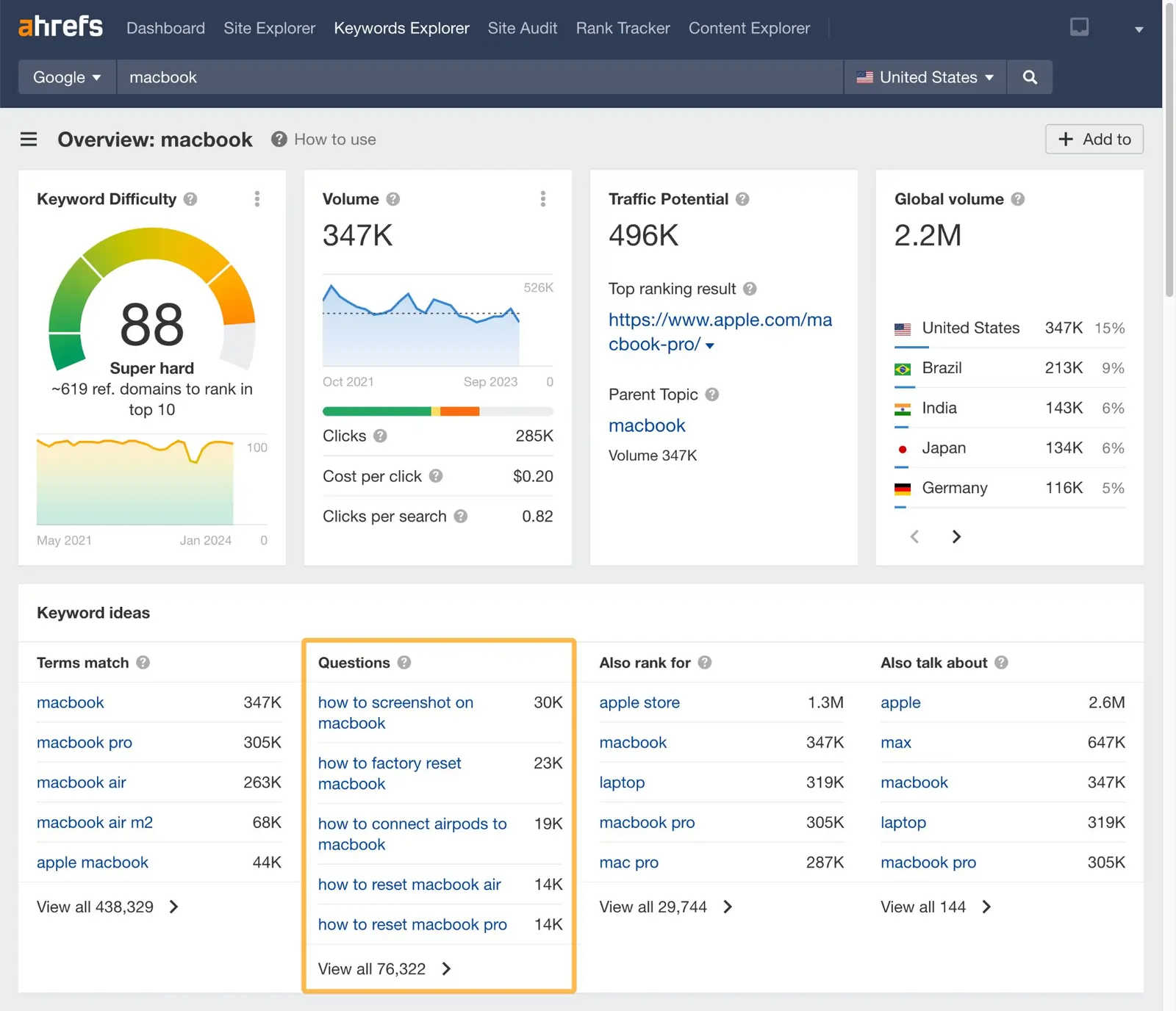
Pros and Cons
- Pros
- One of the best backlink analysis tools available.
- Provides in-depth competitor research and keyword tracking.
- Powerful site audit tool for identifying SEO issues.
- Huge keyword database with accurate search volume data.
- Easy-to-use interface with clear, actionable insights.
- Cons
- Can be expensive for small businesses and freelancers.
- No free plan available, only a trial.
- Some advanced features require a learning curve.
Who It’s For
Ahrefs is a great fit for SEO professionals, digital marketers, and businesses focused on organic growth. It works well for e-commerce brands, content creators, and agencies looking for detailed insights into search rankings, backlinks, and competitor strategies. Businesses that rely on SEO and data-driven decision-making will find it useful. While it offers advanced features, those needing only basic SEO tools may prefer a more budget-friendly option.
SEMrush: Best for all-in-one SEO marketing
 Research database with 24B+ keywords
Research database with 24B+ keywords  Competitor data: Keywords, backlinks & ads
Competitor data: Keywords, backlinks & ads SEMrush is a comprehensive digital marketing tool that helps businesses with SEO, paid search, content marketing, and competitor analysis. It’s widely used for keyword research, site audits, backlink tracking, and PPC campaign optimization, making it a go-to platform for marketers looking to improve online visibility.
SEMrush doesn’t just focus on SEO – it offers a full suite of digital marketing features, including social media tracking, advertising insights, and content planning tools. It’s an all-in-one platform designed to help businesses increase traffic, track competitors, and refine their digital strategy.
Key Features
- Keyword research – Find high-ranking keywords and analyze search volume, difficulty, and trends.
- Competitor analysis – Discover your competitors’ top-performing keywords, backlinks, and traffic sources.
- Site audit – Identify SEO issues, technical errors, and opportunities for improvement.
- Backlink analytics – Monitor backlinks and uncover link-building opportunities.
- PPC and advertising insights – Optimize Google Ads and paid campaigns with detailed data on ad performance.
- Social media tracking – Analyze social media engagement and monitor competitor activity.
- Content marketing toolkit – Plan, create, and optimize content for better search rankings.
- Rank tracking – Monitor keyword performance and visibility in search engine results.
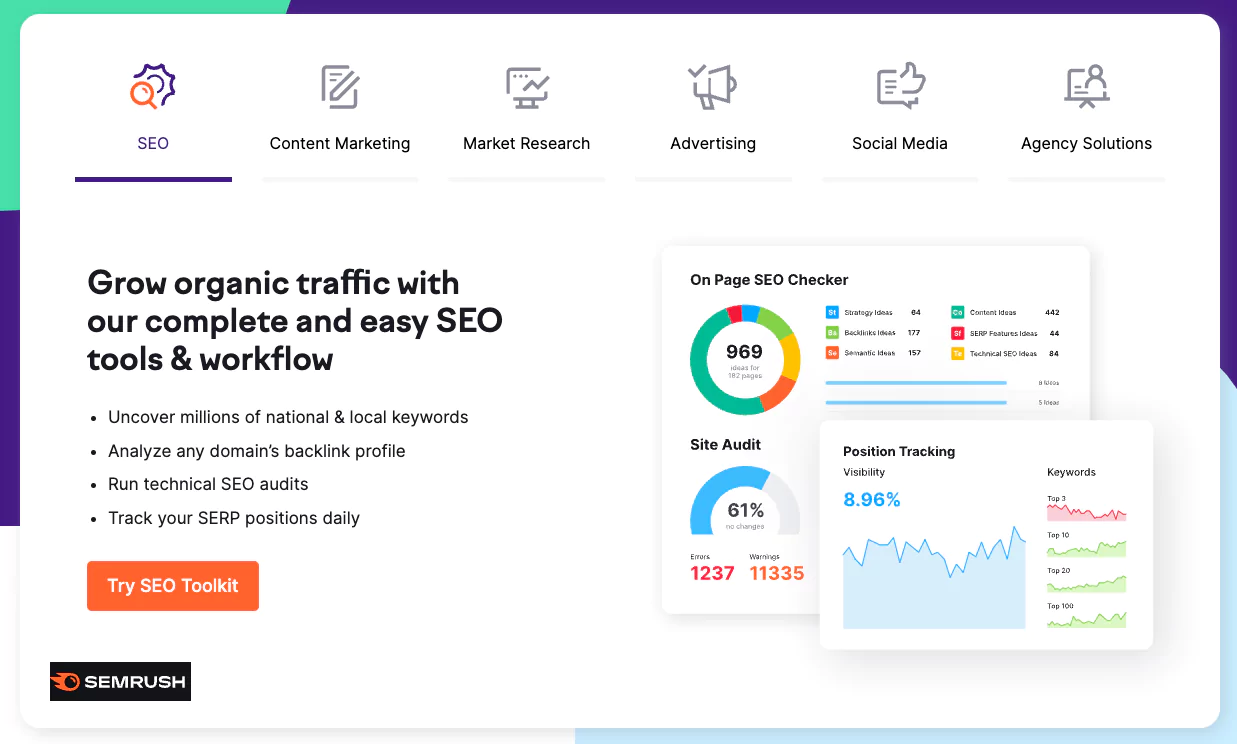
Pros and Cons
- Pros
- All-in-one platform for SEO, PPC, content, and social media.
- Powerful competitor analysis and keyword research tools.
- In-depth site audit to identify technical SEO issues.
- Helps optimize both organic and paid marketing strategies.
- Easy-to-use dashboard with detailed reporting.
- Cons
- Pricing may be high for small businesses.
- Some features can feel overwhelming for beginners.
- Limited access to certain data on lower-tier plans.
Who It’s For
SEMrush is ideal for businesses, marketers, and agencies that need a complete digital marketing tool. It’s useful for SEO professionals, paid search managers, and content marketers who want to track rankings, optimize campaigns, and analyze competitors. For businesses looking to manage both organic and paid search strategies in one place, SEMrush offers a well-rounded solution.
Canva: Best for graphic design & branding
 Built for easy team collaboration
Built for easy team collaboration  Internal content scheduler and publisher
Internal content scheduler and publisher Canva is a graphic design tool that makes it easy for businesses, marketers, and content creators to design professional-looking visuals without advanced design skills. It provides a drag-and-drop editor, customizable templates, and a vast library of graphics, fonts, and stock images, making it perfect for social media posts, marketing materials, presentations, and branding.
Key Features
- Drag-and-drop design editor – No design skills needed; create custom visuals easily.
- Pre-made templates – Thousands of customizable templates for social media, presentations, ads, and more.
- Brand kit – Store logos, brand colors, and fonts to maintain consistency across designs.
- Stock library – Access millions of images, videos, icons, and fonts for creative projects.
- Collaboration tools – Teams can edit designs together in real time.
- Social media scheduling – Create and schedule posts directly from Canva.
- Print-ready designs – Download high-resolution graphics for print marketing materials.
- Video editing – Basic tools for creating and editing short marketing videos.
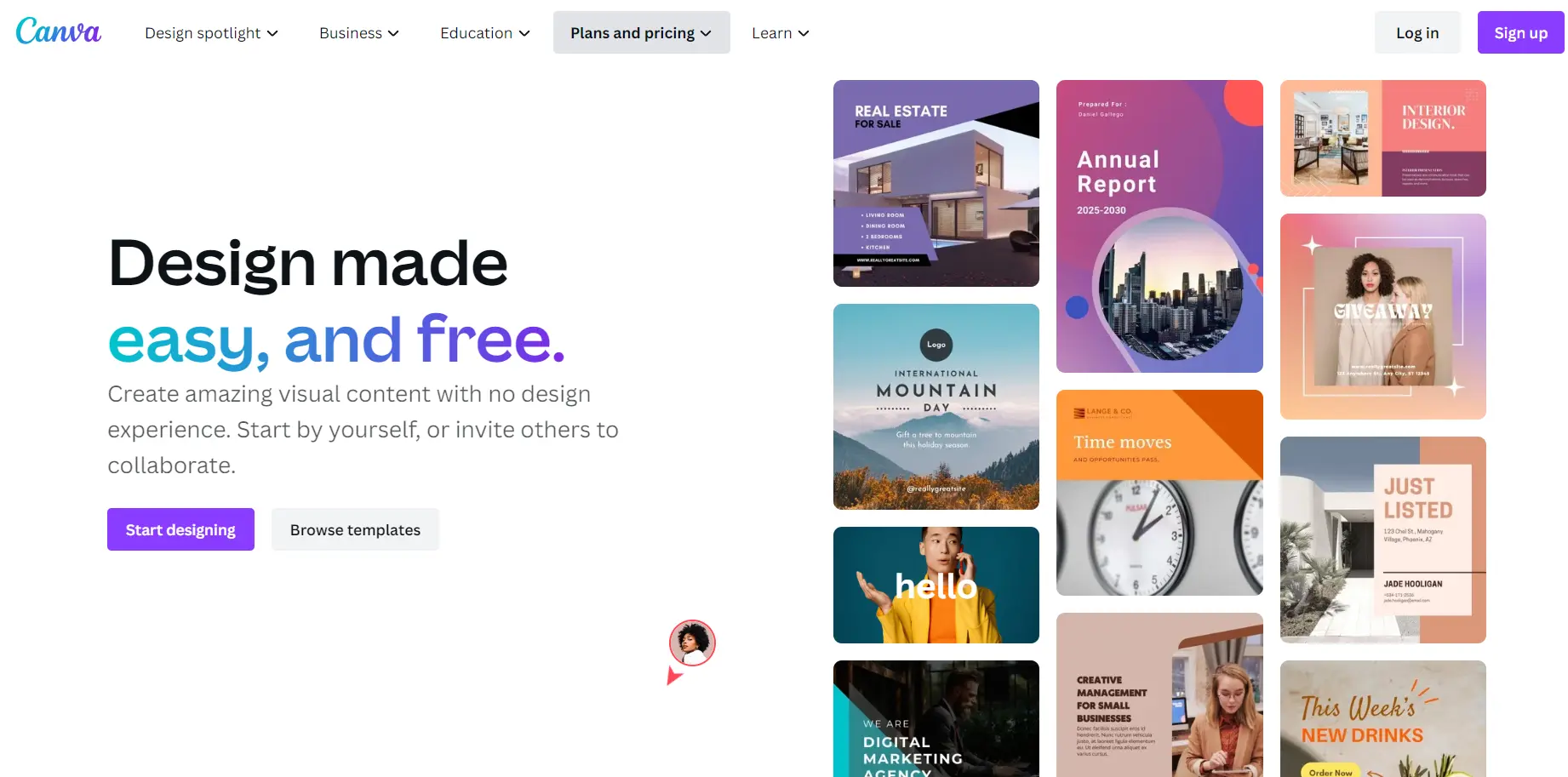
Pros and Cons
- Pros
- Extremely easy to use, even for beginners.
- Wide range of templates for different marketing needs.
- Free plan available with plenty of design options.
- Collaboration features make teamwork simple.
- Affordable compared to professional design software.
- Cons
- Limited advanced design features compared to Photoshop.
- Free version has restrictions on premium assets.
- Some templates can feel generic without customization.
Who It’s For
Canva is perfect for small businesses, startups, marketers, and content creators who need a fast and easy way to design professional visuals. It’s great for social media managers, entrepreneurs, and teams looking to create ads, presentations, infographics, and branding materials without advanced design skills. Canva also applies collaborative features and ready-made templates which make it ideal for teams working on marketing campaigns and businesses that need consistent branding across different platforms.
Figma: Best for Collaborative UI/UX design
 Design responsively with Auto Layout
Design responsively with Auto Layout  Automate your work with Plugins & Widgets
Automate your work with Plugins & Widgets Figma is a collaborative design tool that allows teams to create, prototype, and refine digital designs in real time. Unlike traditional design software, Figma is cloud-based, meaning designers, marketers, and developers can work on the same project from anywhere without needing to install software.
It’s widely used for UI/UX design, branding, and marketing visuals, making it a favorite for businesses, agencies, and teams managing digital projects.
Key Features
- Cloud-based collaboration – Multiple users can edit and comment on designs in real time.
- Prototyping and wireframing – Create interactive mockups for websites, apps, and digital products.
- Design components and templates – Maintain consistency with reusable design elements and templates.
- Version history and file management – Track design changes and revert to previous versions if needed.
- Vector editing tools – Professional-grade tools for creating scalable, high-quality designs.
- Plugins and integrations – Connect with tools like Slack, Notion, and project management software.
- Cross-platform accessibility – Works on Mac, Windows, and directly in the browser with no downloads required.
- Team libraries – Share design assets across teams for a unified brand identity.
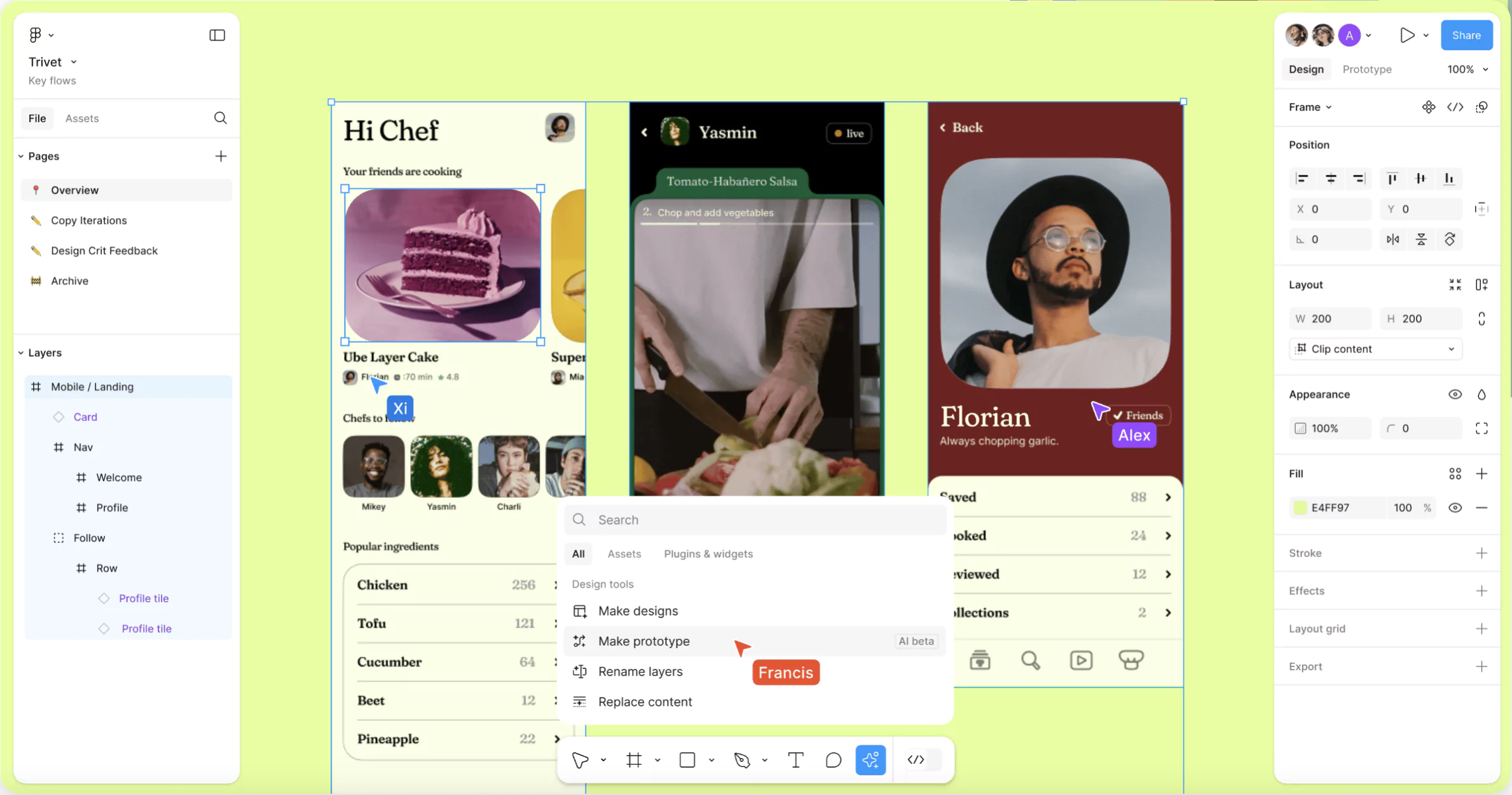
Pros and Cons
- Pros
- Cloud-based, making remote collaboration seamless.
- Real-time editing and feedback for teams.
- Great for UI/UX, web, and app design.
- No software installation required.
- Free version available with strong features.
- Cons
- Requires internet access to use.
- Learning curve for users new to design software.
- Advanced features may be more than some users need.
Who It’s For
Figma is ideal for design teams, UI/UX professionals, marketers, and agencies that need a collaborative, cloud-based design tool. It’s great for startups, tech companies, and businesses creating digital experiences, as well as teams working on branding, websites, and product design. Its real-time collaboration features also make it a strong fit for distributed teams looking for seamless design workflows.
DALL·E 3: Best for AI-generated images
 Modify or expand existing images
Modify or expand existing images  Create different variations of images
Create different variations of images DALL·E 3 is an AI-powered image generation tool that allows businesses and marketers to create unique, high-quality visuals from text prompts. Developed by OpenAI, it enables users to generate custom illustrations, concept art, and marketing graphics without needing advanced design skills.
This tool is especially useful for brands looking for original visuals for social media, ad campaigns, blog posts, and product branding.
Key Features
- AI-generated images – Create detailed visuals from text descriptions in seconds.
- Custom branding and artwork – Generate unique, brand-aligned images without stock photos.
- Multiple style options – Produce illustrations, realistic renders, artistic designs, and more.
- Fast content creation – No need for manual design work or outsourcing to artists.
- Integration with content tools – Works with marketing platforms and AI writing assistants for streamlined content production.
- High-resolution output – Generate images suitable for ads, presentations, and product marketing.
- Unlimited creative possibilities – Use AI to experiment with different styles, colors, and compositions.
- Copyright-safe visuals – No risk of using copyrighted stock images, ensuring unique marketing materials.
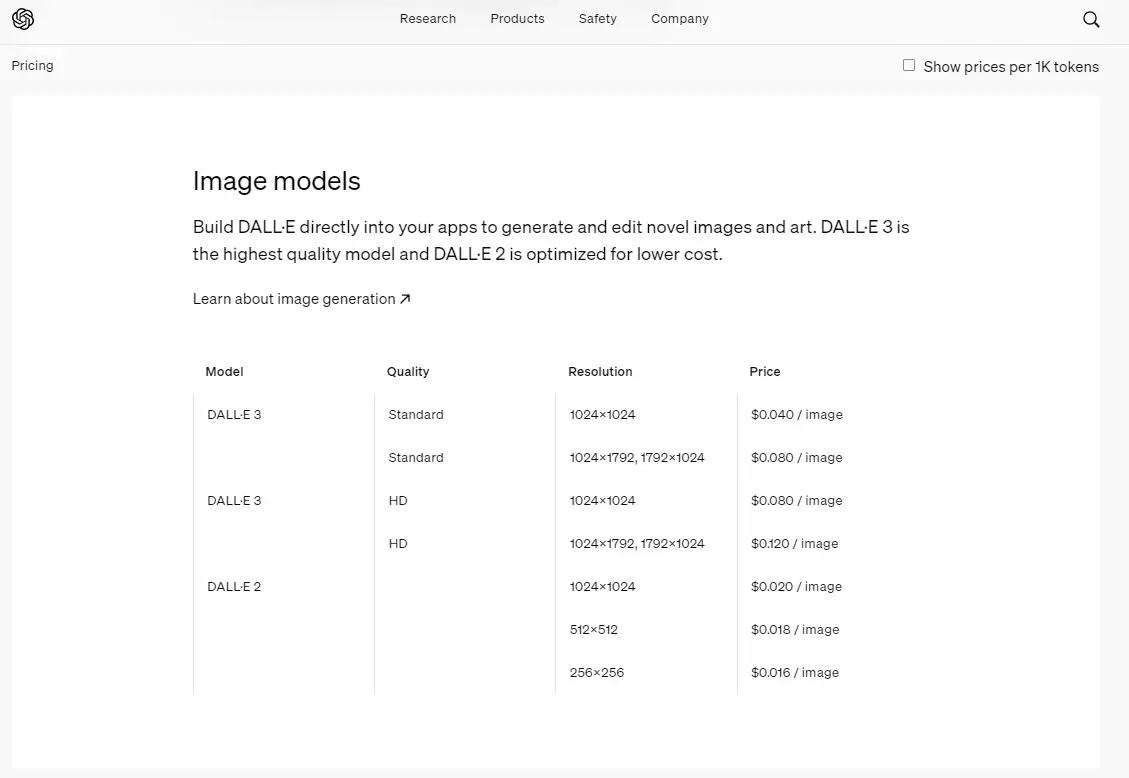
Pros and Cons
- Pros
- Instantly creates original, high-quality images.
- No design skills required to generate custom visuals.
- Helps brands avoid stock image overuse.
- Supports multiple artistic styles.
- Saves time and money on content creation.
- Cons
- AI-generated images may need adjustments for branding consistency.
- Limited control over fine details compared to manual design.
- Requires thoughtful prompt writing for best results.
Who It’s For
DALL·E 3 is a great fit for marketers, content creators, social media managers, and business owners who need custom visuals quickly without hiring a designer. It’s ideal for brands creating unique ad creatives, blog graphics, product images, and concept art. Businesses looking to enhance content with AI-generated visuals will find it especially useful for social media marketing, branding, and digital advertising.
Adobe Photoshop: Best for advanced photo editing
 Smart object integration for scalability
Smart object integration for scalability  Impactful blending modes and layer styles
Impactful blending modes and layer styles Adobe Photoshop is a professional-grade image editing tool widely used by graphic designers, photographers, and marketers for creating high-quality visuals. Known for its advanced editing capabilities, it allows users to design graphics, edit photos, create digital art, and enhance branding materials with precision.
For businesses and marketing teams, Photoshop is a go-to tool for social media graphics, ad creatives, website visuals, and product photography.
Key Features
- Advanced photo editing – Adjust colors, retouch images, and remove backgrounds with precision.
- Layer-based design – Create complex graphics with non-destructive editing.
- AI-powered tools – Use features like content-aware fill and neural filters for quick enhancements.
- Graphic design capabilities – Create logos, branding materials, social media graphics, and ad creatives.
- 3D and animation tools – Design interactive graphics and motion effects.
- Integration with Adobe Creative Cloud – Works seamlessly with Illustrator, InDesign, and Premiere Pro.
- Batch editing and automation – Speed up workflows by applying edits to multiple images at once.
- Customizable brushes and templates – Tailor designs with unique effects and pre-set styles.

Pros and Cons
- Pros
- Industry-leading image editing and design tools.
- Powerful AI features for faster workflows.
- Supports all file formats for digital and print design.
- Works seamlessly with other Adobe software.
- Highly customizable with plugins and brushes.
- Cons
- Steep learning curve for beginners.
- Requires a subscription, with no free version.
- Can be resource-intensive on some computers.
Who It’s For
Adobe Photoshop is best for graphic designers, marketers, photographers, and content creators who need professional-level editing and design capabilities. It’s a great choice for businesses creating ad creatives, branding materials, and high-quality marketing visuals. For teams working on product photography, web design, or digital campaigns, Photoshop offers the depth and flexibility needed to produce polished, impactful content.
Wix: Best for website building
 Choose from 800+ designer made templates
Choose from 800+ designer made templates  1000+ innovative small business features
1000+ innovative small business features Wix is a website builder and digital marketing tool designed for small businesses, entrepreneurs, and e-commerce brands that need a professional-looking website without coding. It offers drag-and-drop customization, built-in SEO tools, and marketing integrations, making it easy to create, optimize, and promote a website in one platform.
Wix is a great solution for businesses looking to establish an online presence quickly and manage digital marketing efforts in one place.
Key Features
- Drag-and-drop website builder – Easily design custom websites without coding.
- AI-powered website creation – Wix ADI (Artificial Design Intelligence) builds personalized websites based on user input.
- Built-in SEO tools – Optimize website content with keyword recommendations and structured data.
- E-commerce functionality – Sell products, manage inventory, and accept online payments.
- Marketing and automation tools – Create email campaigns, social media ads, and customer engagement workflows.
- Customizable templates – Choose from hundreds of professionally designed themes for any industry.
- Mobile optimization – Ensures websites look and function well on all devices.
- App marketplace – Expand functionality with third-party apps for booking, memberships, and more.

Pros and Cons
- Pros
- Beginner-friendly with an intuitive interface.
- All-in-one solution for website building and marketing.
- AI-powered design assistance for fast setup.
- Strong e-commerce and SEO capabilities.
- Hundreds of templates with full customization.
- Cons
- Less flexibility for advanced coding and custom integrations.
- Free plan includes Wix-branded ads.
- Some advanced features require higher-tier plans.
Who It’s For
Wix is perfect for small business owners, startups, freelancers, and e-commerce brands looking for an easy-to-use website builder with built-in marketing tools. It’s a great fit for those who need a professional online presence, SEO-friendly pages, and simple e-commerce functionality without dealing with complex coding. For businesses that want fast, visually appealing websites with marketing automation, Wix provides a versatile and user-friendly solution.
Shopify: Best for e-commerce store management
 Trusted by millions of businesses globally
Trusted by millions of businesses globally  Drag-and-drop store creator
Drag-and-drop store creator Shopify is an e-commerce platform that helps businesses set up, manage, and grow online stores with ease. It comes with built-in payment processing, inventory tracking, and marketing tools, so businesses can handle everything in one place.
Whether selling on a website, social media, or in-person with Shopify POS, Shopify gives businesses the flexibility to customize their store, automate tasks, and track performance—all without needing advanced tech skills.
Key Features
- Online store builder – Create and customize a fully functional e-commerce site with a drag-and-drop editor.
- Built-in payment processing – Accept credit cards, PayPal, Apple Pay, and more without third-party integrations.
- Multi-channel selling – Sell on your website, social media, Amazon, and in-person with Shopify POS.
- SEO and marketing tools – Optimize your store for search engines and run email and social media campaigns.
- Abandoned cart recovery – Automatically remind shoppers to complete their purchases.
- Inventory and order management – Track stock levels, manage suppliers, and automate fulfillment.
- App marketplace – Access thousands of integrations for marketing, analytics, and automation.
- Analytics and reporting – Get insights into customer behavior, sales trends, and overall store performance.
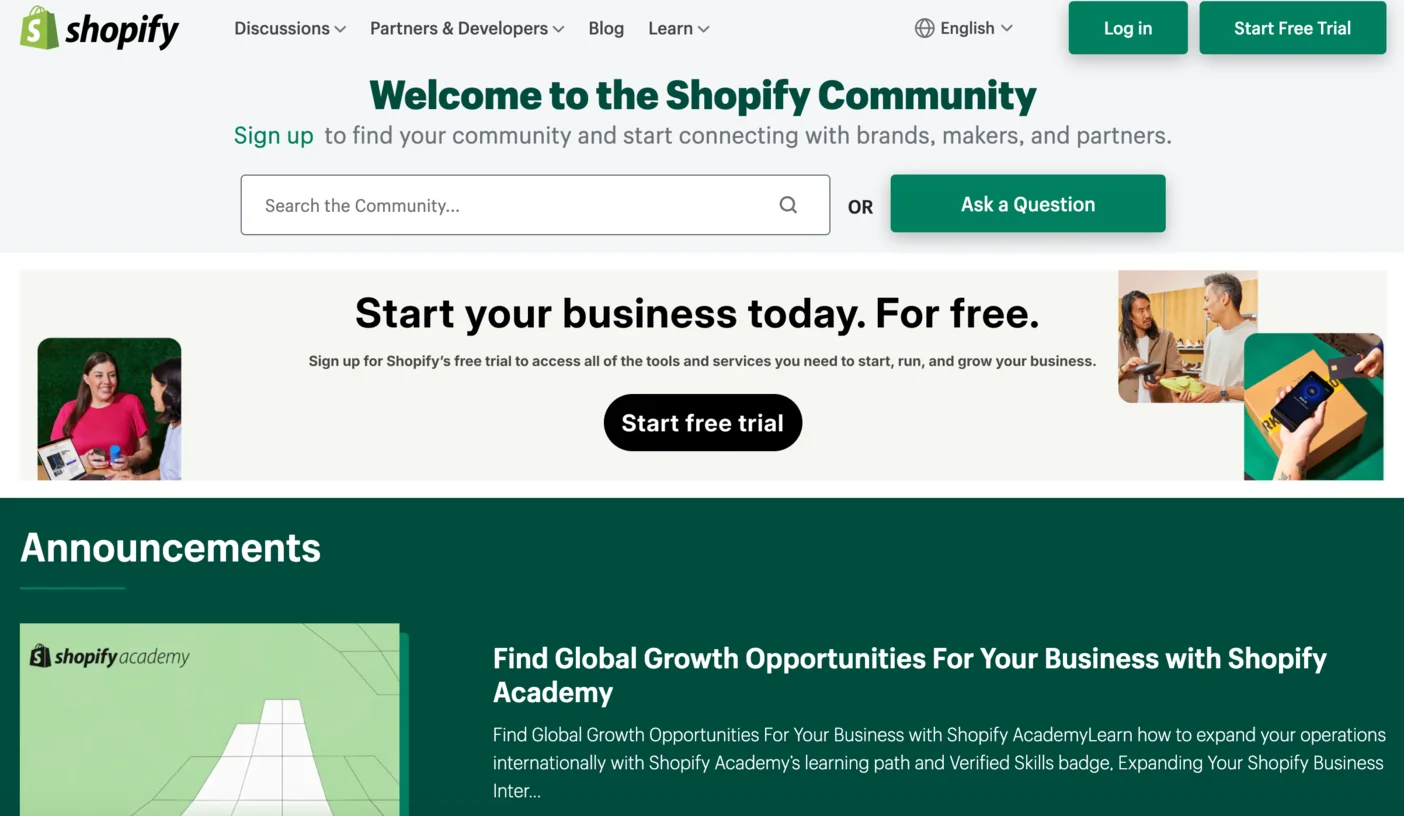
Pros and Cons
- Pros
- Easy-to-use website builder with no coding required.
- Built-in payment processing and multi-channel selling.
- Strong SEO and marketing tools to boost visibility.
- Scalable for small businesses and large e-commerce brands.
- 24/7 customer support and a large app marketplace for added features.
- Cons
- Monthly subscription required, with extra costs for premium apps.
- Some advanced customizations may require coding knowledge.
- Transaction fees apply unless using Shopify Payments.
Who It’s For
Shopify is great for e-commerce businesses, entrepreneurs, and retail brands looking for an easy-to-use platform to sell online. It’s a strong fit for small businesses starting out, growing brands needing scalability, and established retailers expanding into digital sales. With built-in marketing tools and multi-channel selling, it’s also ideal for businesses that want to manage everything—sales, payments, and inventory—in one place.
ChatGPT: Best for AI-powered content creation
 Elevate SEO with keyword integration
Elevate SEO with keyword integration  Translate & localize for global audiences
Translate & localize for global audiences ChatGPT is an AI-powered writing assistant designed to help businesses and marketers generate content, brainstorm ideas, and automate customer interactions. It uses natural language processing (NLP) to create text-based responses, articles, marketing copy, and more in a conversational and human-like manner.
Businesses use ChatGPT for content creation, customer support, email drafting, social media captions, and even coding assistance. Its ability to adapt to different writing styles and provide instant responses makes it a versatile tool for marketers, content creators, and businesses looking to streamline communication and content production.
Key Features
- AI-generated content – Instantly create blog posts, social media captions, emails, and more.
- Conversational AI – Engages in human-like conversations for chatbots, customer support, and interactive tools.
- Customizable tone and style – Adjusts writing to fit different brand voices and audiences.
- Content brainstorming – Generates ideas, outlines, and suggestions for creative projects.
- SEO-friendly writing – Helps optimize content with relevant keywords and structure.
- Multilingual capabilities – Supports multiple languages for global communication.
- Code assistance – Provides help with debugging, explanations, and writing simple code.
- Integration with business tools – Works with platforms like Slack, Notion, and various automation tools.
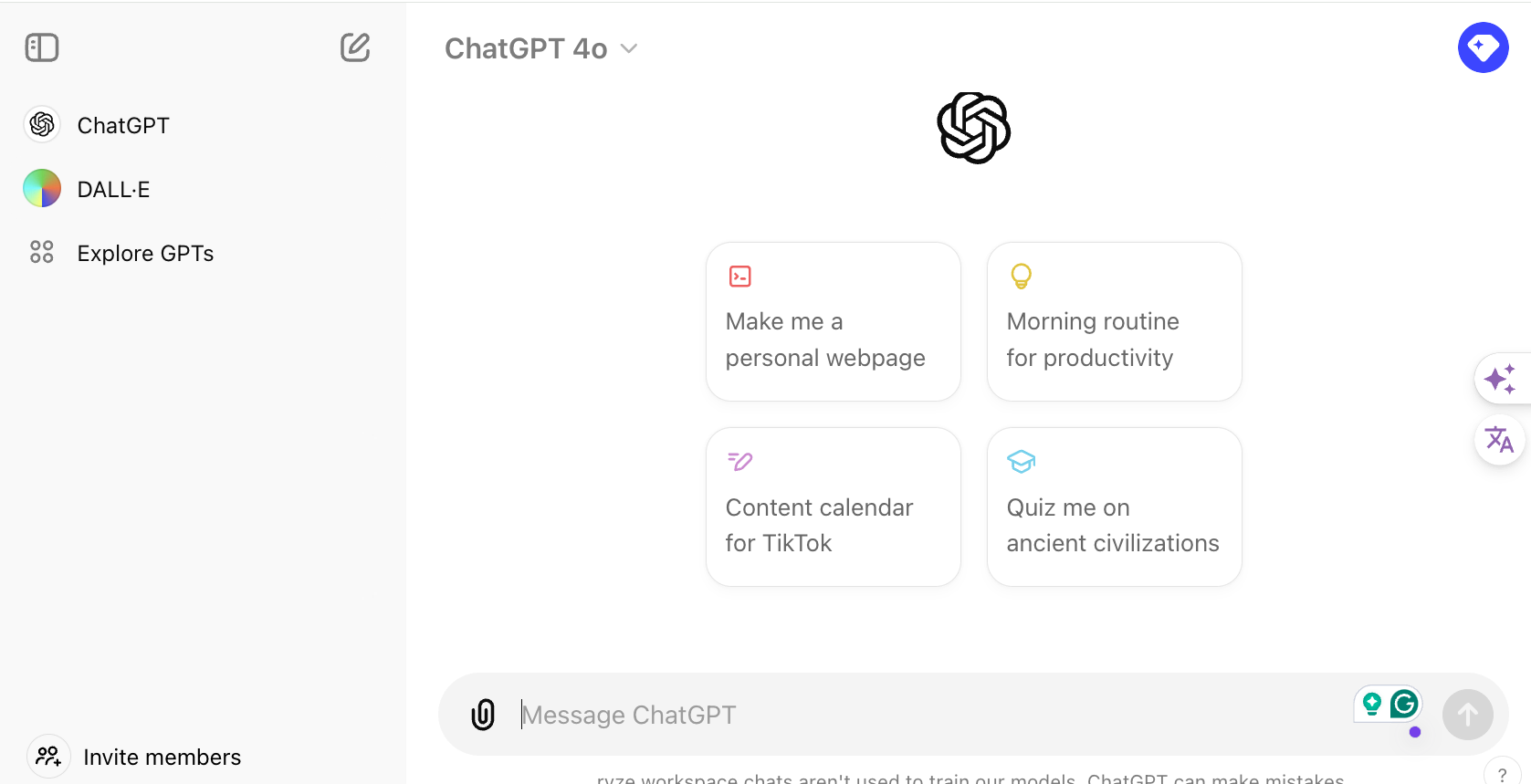
Pros and Cons
- Pros
- Quickly generates content for blogs, social media, emails, and more.
- Adapts tone and style to match different brand voices.
- Useful for brainstorming, idea generation, and content outlines.
- Can assist with customer support and chatbot automation.
- Supports multiple languages for global communication.
- Cons
- May require human editing to ensure accuracy and consistency.
- Limited real-time data unless integrated with external sources.
- Can occasionally generate generic or repetitive responses.
Who It’s For
ChatGPT is ideal for marketers, content creators, business owners, and customer support teams looking to automate writing tasks and generate high-quality content quickly. It’s a great fit for small businesses needing social media posts, email drafts, and product descriptions, as well as larger teams managing customer interactions, brainstorming ideas, and streamlining content production. Its flexibility makes it useful for anyone who wants to save time on writing while maintaining a natural, engaging tone.
Gemini: Best for AI-assisted research & writing
 Built-in fact-checking and citation tools
Built-in fact-checking and citation tools  Boost your writing skills & efficiency
Boost your writing skills & efficiency Gemini is an AI-powered assistant developed by Google, designed to help businesses and individuals generate content, analyze data, and enhance productivity. With deep integration into Google’s ecosystem, Gemini offers real-time insights, research assistance, and content creation capabilities, making it a versatile tool for marketers, writers, and businesses.
Unlike other AI tools, Gemini is built to process and understand complex queries, making it useful for writing, brainstorming, summarizing information, and even handling coding tasks. Its ability to integrate with Google Workspace and other platforms makes it a seamless addition to marketing workflows, content creation, and business operations.
Key Features
- AI-powered content generation – Creates blog posts, emails, social media content, and marketing copy.
- Deep integration with Google Workspace – Works seamlessly with Google Docs, Sheets, and Gmail for enhanced productivity.
- Advanced research and data analysis – Processes complex queries and provides real-time insights.
- Multimodal capabilities – Understands and generates text, images, and even code for various use cases.
- Summarization and text enhancement – Helps refine, simplify, or expand written content for better clarity.
- Conversational AI for customer support – Assists with chatbots and automated responses to improve engagement.
- Coding assistance – Provides explanations, debugging support, and code suggestions.
- Multilingual support – Generates content in multiple languages for global communication.
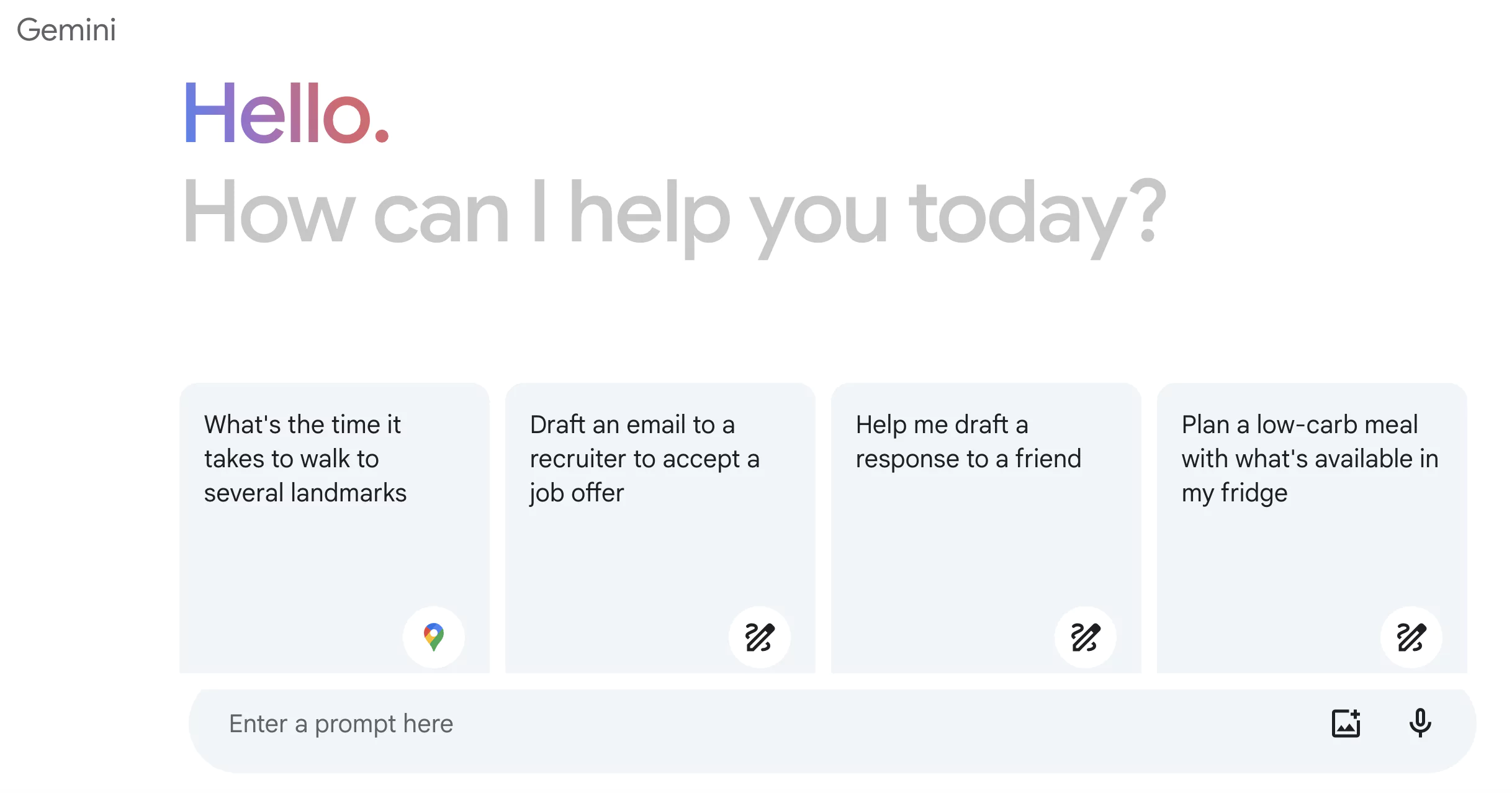
Pros and Cons
- Pros
- Generates content, analyzes data, and assists with research.
- Integrates seamlessly with Google Workspace for efficiency.
- Supports text, images, and coding assistance.
- Provides real-time insights and summarization tools.
- Works in multiple languages for global users.
- Cons
- Limited availability outside Google’s ecosystem.
- Requires an internet connection for optimal performance.
- May need human editing for accuracy and brand consistency.
Who It’s For
Gemini is ideal for marketers, business professionals, content creators, and researchers who need an AI assistant for content generation, data analysis, and workflow automation. It’s a great fit for teams already using Google Workspace, as it integrates seamlessly with Docs, Sheets, and Gmail. Businesses looking for AI-powered research, writing assistance, and automation tools will benefit from its ability to streamline tasks and enhance productivity across multiple areas.
Jasper: Best for AI marketing copywriting
 Built-in collaboration tools for teams
Built-in collaboration tools for teams  SEO capabilities for search engines
SEO capabilities for search engines Jasper is an AI-powered writing tool designed to help businesses and marketers create high-quality content quickly and efficiently. It specializes in AI-generated blog posts, social media content, email marketing, and ad copy, making it a popular choice for brands looking to scale their content production.
Jasper enables users to write persuasive and engaging content while saving time. Its AI-assisted writing capabilities make it a valuable tool for businesses aiming to improve marketing, branding, and audience engagement.
Key Features
- AI-generated content – Creates blog posts, social media captions, emails, and marketing copy in seconds.
- Customizable tone and style – Adjusts writing to match brand voice and target audience.
- Pre-built templates – Offers ready-to-use templates for ads, emails, blogs, and product descriptions.
- SEO optimization tools – Helps improve search rankings by suggesting keywords and structuring content for better visibility.
- Long-form content assistant – Assists with generating in-depth articles, reports, and eBooks.
- Multilingual support – Writes in multiple languages to reach a global audience.
- Collaboration features – Allows teams to work together on content creation with shared projects.
- Integration with marketing tools – Works with platforms like Surfer SEO, Grammarly, and Google Docs for a seamless workflow.
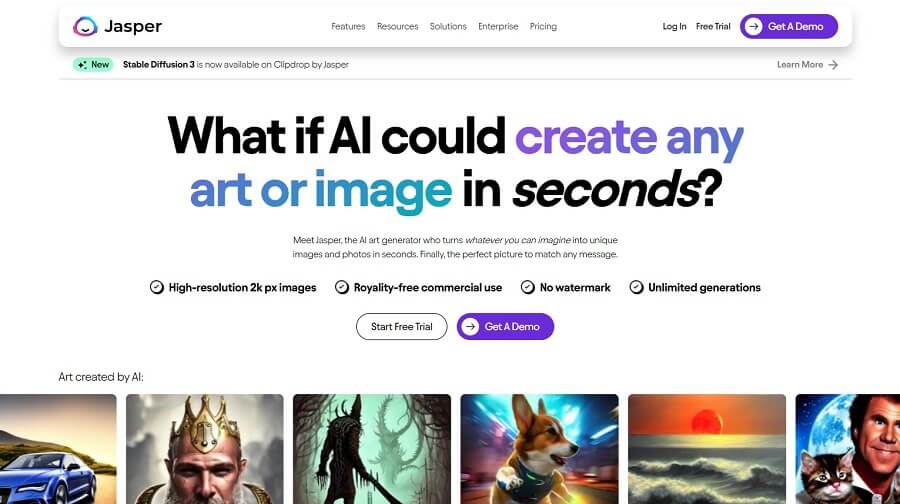
Pros and Cons
- Pros
- Generates content, analyzes data, and assists with research.
- Integrates seamlessly with Google Workspace for efficiency.
- Supports text, images, and coding assistance.
- Provides real-time insights and summarization tools.
- Works in multiple languages for global users.
- Cons
- Limited availability outside Google’s ecosystem.
- Requires an internet connection for optimal performance.
- May need human editing for accuracy and brand consistency.
Who It’s For
Gemini is ideal for marketers, business professionals, content creators, and researchers who need an AI assistant for content generation, data analysis, and workflow automation. It’s a great fit for teams already using Google Workspace, as it integrates seamlessly with Docs, Sheets, and Gmail. Businesses looking for AI-powered research, writing assistance, and automation tools will benefit from its ability to streamline tasks and enhance productivity across multiple areas.
Grammarly: Grammar and style enhancement
 Readability score for intended audience
Readability score for intended audience  Plagiarism checker against 1B+ web pages
Plagiarism checker against 1B+ web pages Grammarly is an AI-powered writing assistant that helps users improve grammar, clarity, and tone across emails, documents, and marketing content. It provides real-time writing suggestions, ensuring that content is polished, professional, and engaging.
More than just a spell checker, Grammarly offers style enhancements, plagiarism detection, and AI-driven rewriting suggestions, making it useful for marketers, business professionals, and content creators who want to refine their messaging and maintain consistency across platforms.
Key Features
- Real-time grammar and spelling checks – Instantly detects and corrects errors to improve writing quality.
- Tone and clarity adjustments – Suggests refinements to ensure the message is clear, professional, and engaging.
- AI-powered rewriting – Offers alternative phrasing for better readability and impact.
- Plagiarism detection – Scans content against online sources to ensure originality.
- Customization options – Allows users to set writing goals, such as tone, formality, and audience type.
- Integration with popular tools – Works with Google Docs, Microsoft Word, email platforms, and web browsers.
- Multilingual support – Provides suggestions for improving writing in multiple languages.
- Team collaboration features – Helps businesses maintain a consistent brand voice across teams and departments.
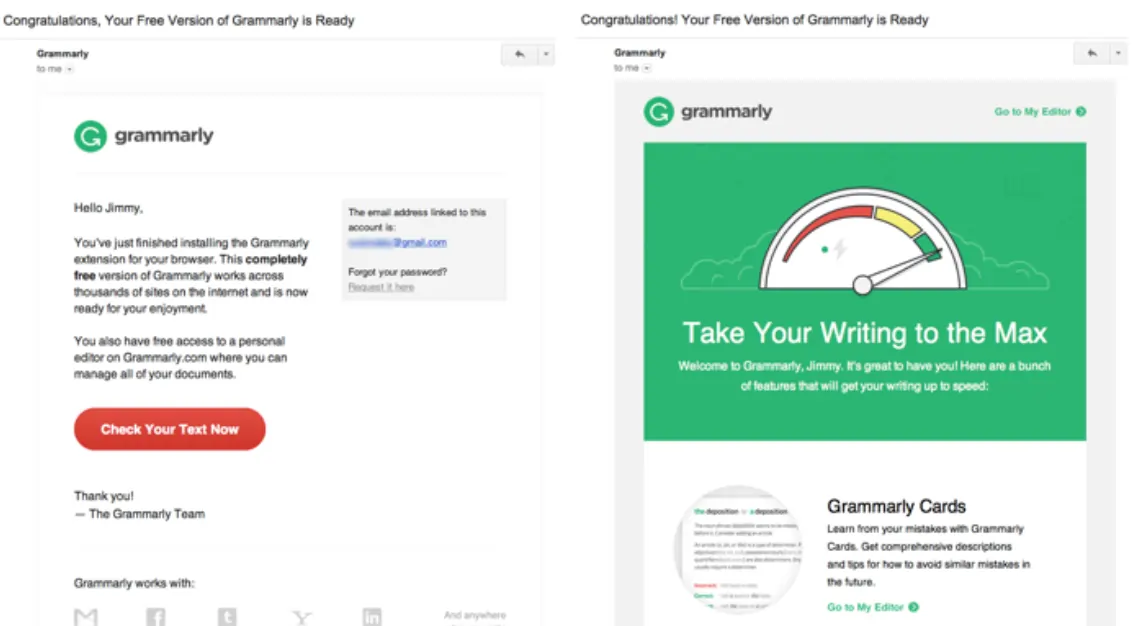
Pros and Cons
- Pros
- Provides real-time grammar, spelling, and style suggestions.
- Helps refine tone, clarity, and overall readability.
- Plagiarism checker ensures content originality.
- Integrates with popular tools like Google Docs and Microsoft Word.
- AI-powered rewriting helps improve sentence flow and engagement.
- Cons
- Free version has limited features compared to premium plans.
- Some AI-generated suggestions may not fit every writing style.
- Requires an internet connection to function.
Who It’s For
Grammarly is perfect for marketers, business professionals, content creators, and students who want to improve writing quality and ensure clarity in their communication. It’s especially useful for teams managing brand messaging, professionals writing reports and emails, and content creators crafting articles, blogs, and social media posts. With its grammar checking, tone analysis, and plagiarism detection, it’s a valuable tool for anyone looking to write with confidence and professionalism.
Mailchimp: Best for advanced audience segmentation
 Customer loyalty tools to boost retention
Customer loyalty tools to boost retention  Targeted marketing: Personalization tools
Targeted marketing: Personalization tools Mailchimp is an email marketing and automation platform designed to help businesses create, send, and optimize email campaigns with ease. It offers email templates, audience segmentation, A/B testing, and marketing automation tools, making it a popular choice for businesses looking to engage customers and drive conversions.
Beyond email, Mailchimp provides social media posting, landing page creation, and e-commerce integrations, allowing businesses to manage multiple marketing channels from one platform. Its user-friendly interface and automation features make it a go-to solution for small businesses, startups, and growing brands.
Key Features
- Email marketing automation – Create, schedule, and automate email campaigns for customer engagement.
- Audience segmentation – Target specific customer groups based on behavior, demographics, and purchase history.
- A/B testing – Test different subject lines, email content, and designs to improve performance.
- Drag-and-drop email builder – Easily customize email templates without coding.
- Landing page and form builder – Create sign-up forms and landing pages to capture leads.
- E-commerce integrations – Sync with Shopify, WooCommerce, and other platforms to streamline marketing efforts.
- Social media marketing – Schedule and manage posts directly from the platform.
- Analytics and reporting – Track email open rates, click-through rates, and overall campaign performance.
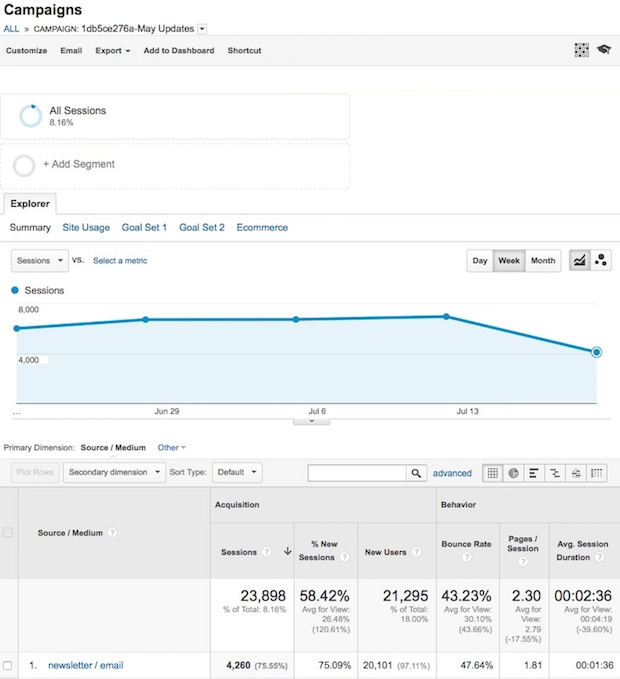
Pros and Cons
- Pros
- Easy-to-use email builder with drag-and-drop functionality.
- Strong automation and audience segmentation tools.
- Integrates with e-commerce platforms like Shopify and WooCommerce.
- A/B testing helps optimize email performance.
- Free plan available with basic features.
- Cons
- Pricing increases as subscriber lists grow.
- Some advanced features are limited to higher-tier plans.
- Customization options may feel restrictive for experienced marketers.
Who It’s For
Mailchimp is great for small businesses, startups, e-commerce brands, and marketers who need an easy-to-use platform for email marketing and automation. It’s ideal for businesses looking to engage customers through personalized email campaigns, segment audiences, and track marketing performance. With its e-commerce integrations and social media tools, Mailchimp is also a strong fit for online stores and growing brands that want to manage multiple marketing channels in one place.
Related Articles
The Importance of Digital Marketing Tools
In a world where everything happens online, marketing without the right tools is like navigating without a map. Whether you run a small business, an e-commerce store, or a large enterprise, digital marketing tools help you work smarter—from automating campaigns to tracking performance and fine-tuning engagement strategies.
Why Digital Marketing Tools Matter:
- Efficiency and automation – Automate repetitive tasks like email marketing, social media scheduling, and customer segmentation to save time and resources.
- Data-driven decision-making – Get real-time insights into website traffic, conversions, and customer behavior to optimize marketing strategies.
- Improved audience targeting – Use SEO, analytics, and CRM tools to reach the right audience with personalized messaging.
- Stronger brand presence – From content creation to social media management, marketing tools help businesses stay visible and competitive.
- Scalability – As businesses grow, the right tools make it easy to expand marketing efforts without increasing workload.
With so many moving parts in modern marketing, having the right tools means working smarter, not harder. Whether it’s SEO, social media, email marketing, or analytics, digital marketing tools help businesses stay ahead and drive real results.
Key Benefits of Digital Marketing Tools
Using the right digital marketing tools gives businesses an edge by automating tasks, optimizing campaigns, and improving customer engagement. From SEO and social media to email marketing and analytics, these tools help brands work more efficiently and achieve better results.
- Time-saving automation – Automate email campaigns, social media posts, and customer follow-ups, freeing up time for strategy and growth.
- Better audience targeting – Use data-driven insights to reach the right customers with personalized messaging and offers.
- Improved marketing performance – Track key metrics like conversions, website traffic, and engagement to refine strategies for better results.
- Cost-effective advertising – Optimize ad spending by focusing on high-performing campaigns and eliminating ineffective ones.
- Stronger customer relationships – Use CRM and email marketing tools to nurture leads and maintain ongoing communication with your audience.
- Scalability – As your business grows, digital marketing tools allow you to scale efforts without dramatically increasing workload or costs.
- Competitive advantage – Stay ahead of competitors by leveraging SEO, social media analytics, and AI-powered content creation for smarter marketing decisions.
- Consistent branding – Maintain a unified brand presence across multiple platforms, from social media to email marketing and beyond.
Steps to Choosing the Right Digital Marketing Tools
Finding the best digital marketing tools depends on your business goals, budget, and the marketing channels you prioritize. Here’s how to make the right choice:
- Define your marketing needs – Identify whether you need tools for SEO, email marketing, social media, content creation, or analytics.
- Set a budget – Determine how much you’re willing to invest and compare free vs. paid options to find the best value.
- Check for integrations – Ensure the tool works seamlessly with your existing platforms, such as CRM software, e-commerce systems, or analytics tools.
- Evaluate ease of use – Look for a user-friendly interface that fits your team’s skill level and won’t require extensive training.
- Consider automation and AI features – Tools with automation capabilities help save time by streamlining tasks like email scheduling, ad management, and content generation.
- Look at scalability – Choose a tool that can grow with your business, whether you need more users, additional features, or enterprise-level solutions.
- Read user reviews and case studies – Research feedback from businesses similar to yours to see how the tool performs in real-world applications.
- Test with free trials – Take advantage of free trials or demos to explore the tool’s functionality before committing.
Final Thoughts
The right digital marketing tools can make all the difference in how effectively your business engages customers, tracks performance, and scales its marketing efforts. Whether you’re optimizing SEO, automating emails, managing social media, or analyzing campaign data, having the right tools helps you work smarter, not harder.
With so many options available, it’s worth testing out different platforms, comparing features, and choosing tools that align with your goals. Investing in the right marketing technology doesn’t just save time—it gives your brand a competitive edge and sets you up for long-term success.
FAQ
Q: What are digital marketing tools?
A: Digital marketing tools are software applications designed to help businesses plan, execute, and analyze their marketing campaigns across various online platforms. These tools assist in tasks like content creation, social media management, email marketing, SEO, and data analytics.
Q: Why are digital marketing tools important for small businesses?
A: For small businesses, digital marketing tools offer cost-effective solutions to reach a broader audience, engage with customers, and compete with larger companies. They streamline marketing efforts, provide valuable insights, and help in building a strong online presence.
Q: How do I choose the right digital marketing tools for my business?
A: To select the appropriate tools, assess your business goals, target audience, and marketing budget. Consider tools that integrate well with your existing systems, offer scalability, and provide analytics to measure performance. Testing free trials can also help determine the best fit.
Q: Can digital marketing tools improve my website’s SEO?
A: Yes, many digital marketing tools are specifically designed to enhance SEO. They assist in keyword research, on-page optimization, backlink analysis, and tracking search engine rankings, helping to increase organic traffic to your website.
Q: What role do analytics play in digital marketing tools?
A: Analytics are crucial as they provide data-driven insights into the performance of your marketing campaigns. They help identify what strategies are working, understand customer behavior, and guide decision-making to optimize future marketing efforts.
Q: Are there free digital marketing tools available?
A: Yes, there are several free digital marketing tools that offer basic functionalities. Examples include Google Analytics for website traffic analysis, Mailchimp’s free tier for email marketing, and Canva for graphic design. As your needs grow, paid versions with advanced features are available.
Q: How can social media management tools benefit my business?
A: Social media management tools help schedule posts, monitor engagement, analyze performance, and manage multiple accounts from a single dashboard. They save time and ensure consistent and effective social media presence.
Q: What is marketing automation, and how do tools facilitate it?
A: Marketing automation involves using software to automate repetitive marketing tasks such as email campaigns, social media posting, and ad management. Tools facilitate this by setting up workflows that trigger actions based on customer behavior, improving efficiency and personalization.
Q: How do digital marketing tools assist in content creation?
A: These tools offer features like content planning calendars, SEO optimization suggestions, grammar and plagiarism checks, and design templates. They streamline the content creation process, ensuring quality and relevance.
Q: Can digital marketing tools help with email marketing campaigns?
A: Absolutely. Email marketing tools assist in designing emails, segmenting audiences, automating send times, and tracking open and click-through rates. They enhance the effectiveness of email campaigns and customer engagement.








